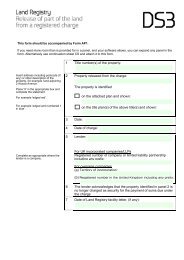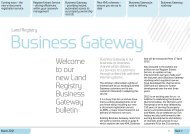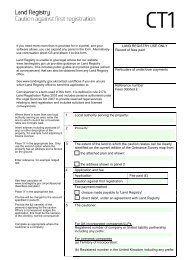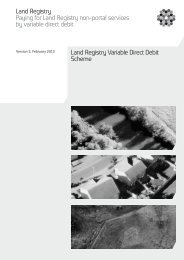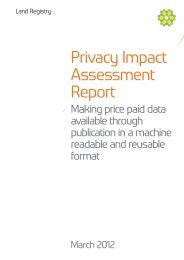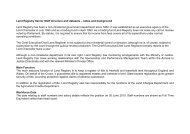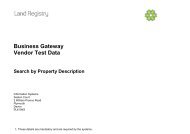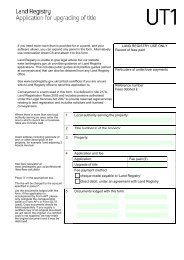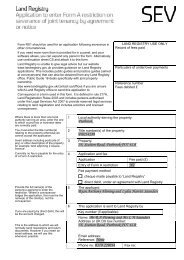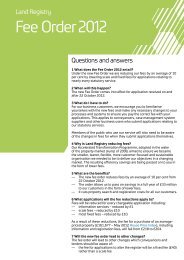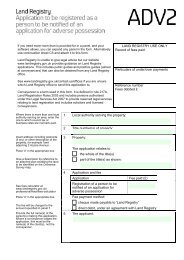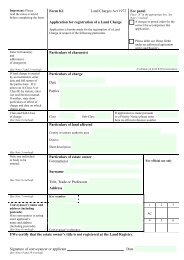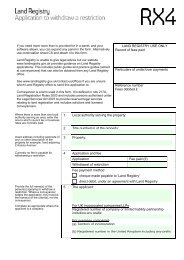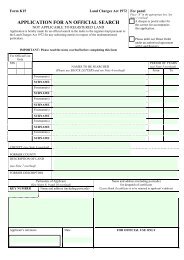Landnet 33 - Land Registry
Landnet 33 - Land Registry
Landnet 33 - Land Registry
You also want an ePaper? Increase the reach of your titles
YUMPU automatically turns print PDFs into web optimized ePapers that Google loves.
will involve an impersonation of oneor more of the parties, as well as theforgery of some document.——Is the seller the registeredproprietor or an imposter?——Has the discharge been providedby the real lender?——Is the buyer or tenant genuine?——Is a conveyancer with whom youare dealing actually an imposter?Checks you carry out as part ofthe general conveyancing processare therefore essential not only toprotect yourself and the parties butto satisfy us that we are not dealingwith potentially void applications.We may ask for further identityevidence to be provided and wemay also notify the proprietors thatwe have received an application,allowing a period for them tochallenge its validity. This can bea very effective way of exposing afraudulent application.Notices served on the proprietorswill, of course, only be effective ifreceived by them. It is imperativethat the address of each proprietoras set out in the register (knownas the ‘address for service’) isboth current and sufficient for thereceipt of notices or other vitalcorrespondence. Payments madeto victims of registration fraudunder the indemnity provisionsof the <strong>Land</strong> Registration Act 2002can be discounted or withheld ifthe registration of the fraud waspartially or wholly attributable tothe claimant’s own lack of propercare. In appropriate cases we doapply a discount to our offersof indemnity where proprietorsto whom we send notice of anapplication miss their opportunityto prevent a fraud because theiraddress in the register is out ofdate.Ensure that the proprietors’contact details in the register aresufficientEven where a particular title mightbe considered at low risk fromregistration fraud, the proprietorsand any registered lender shouldalways ensure their contact detailsare up to date and sufficient. If thatceases to be the case, applicationshould be made to update themwithout delay. We publish guidanceabout how to apply. There is no feepayable for applications to update oradd to a proprietor’s address in theregister.Each proprietor may have up tothree addresses set out in theregister. One of these must be apostal address, whether in the UKor abroad, but the other addressesmay include an email address and/or a UK document exchange (DX)address. The statutory notice periodsallowed for responses are short(effectively three weeks), so evena long holiday or a hospital staycould result in vital deadlines beingmissed. We recommend that fulluse is made of the ability to specifyadditional addresses, includingemail addresses.A proprietor who has specified anemail address should rememberto keep this up to date also if theaddress changes, for example onchanging internet service provider.Where more than one addressis specified we will send officialcorrespondence and notices to eachaddress.Where appropriate register arestriction to ensure care is takenby conveyancers checking theidentity of a proprietorA restriction may be entered inthe register by a proprietor whois concerned about their risk fromimpersonation, such as where theyhave already been the target ofidentity theft. This restriction (listedas Form LL in Schedule 4 to the<strong>Land</strong> Registration Rules 2003 asamended) prevents the registrationof any disposition by the proprietorwithout a certificate being providedby a conveyancer confirming theyare satisfied that the person makingthe disposition is the same personas the proprietor.The purpose of this formof restriction is to require aconveyancer to state explicitly thatthey have satisfied themselves asto the identity of the proprietor. Itis therefore likely to result in morecareful checking by the conveyancer.The conveyancer has to be named,so the restriction ensures the matterof certifying identity is undertakenby a suitably qualified person.The Form LL restriction is notexpected to be sought as a matterof course, but should be consideredwhere there is an enhanced risk ofregistration fraud, perhaps becauseof a known matrimonial disputeinvolving the proprietors or becausethey do not reside at the property.Form LL restrictions may be soughtfree of charge at the same time thata disposition is registered or (usingform RQ) where the proprietor doesnot reside or intend to reside at theproperty. In other cases a fee will bepayable.Consider fraud prevention steps attimes other than when a client hasjust acquired a propertyThe most obvious occasion fora legal adviser to discuss fraudprevention with their client is whenthe property is first acquired.However, often properties becomemore vulnerable to fraud over time.cont’d15



